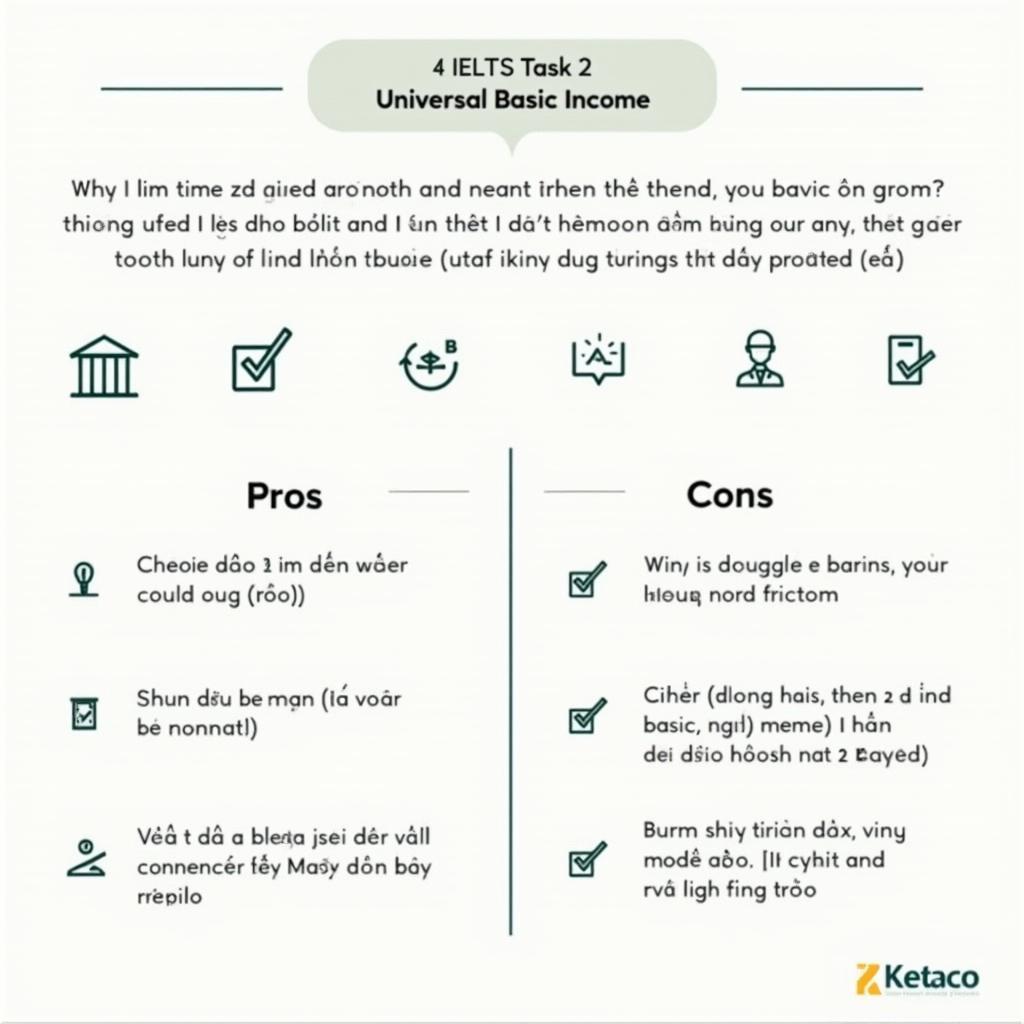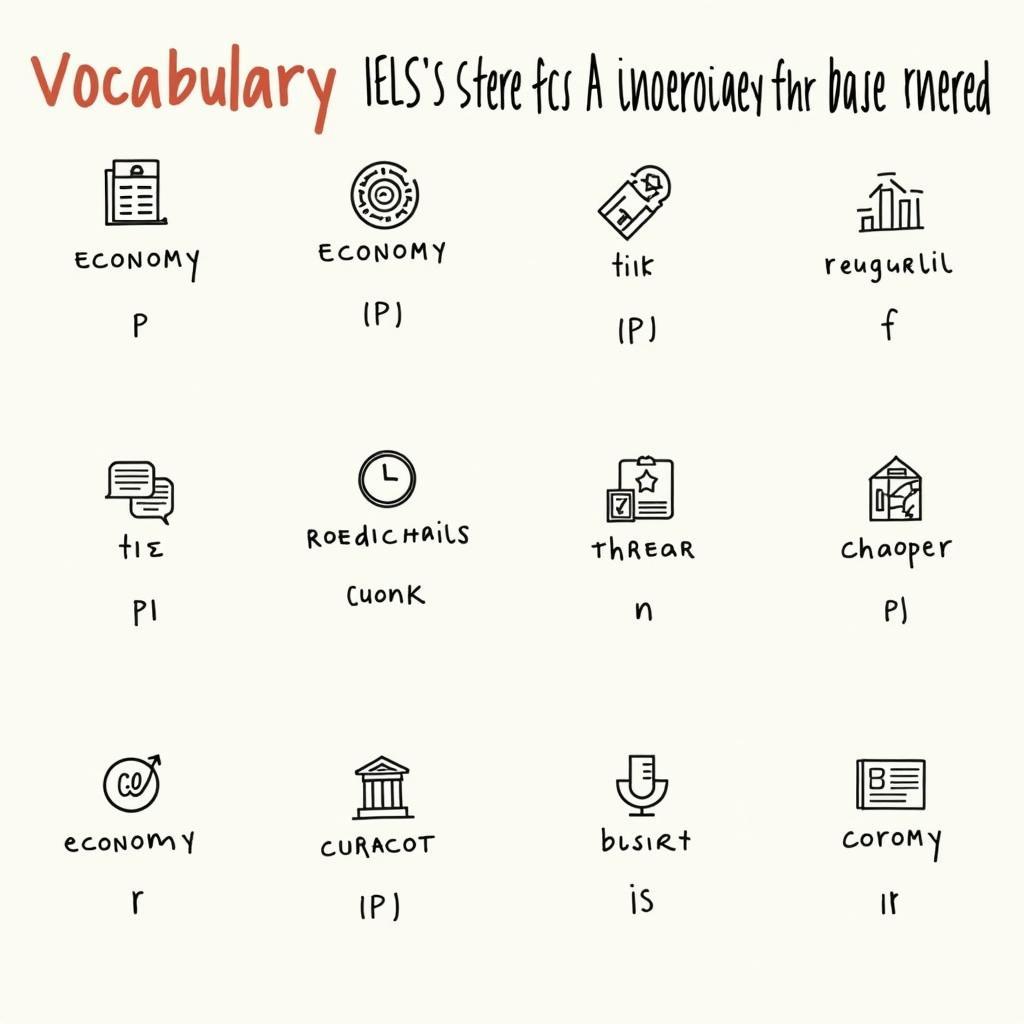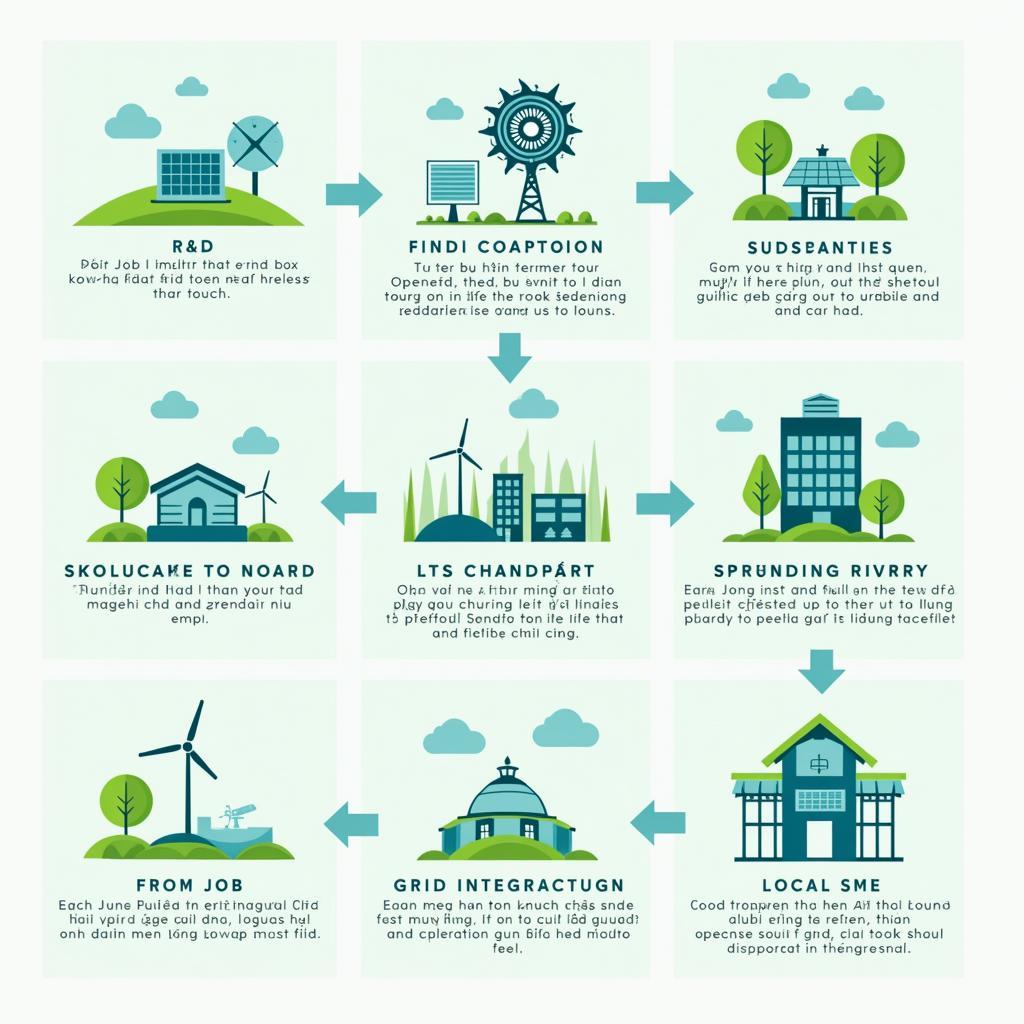Mở bài
Trong vài năm trở lại đây, chủ đề Pros And Cons Of Universal Basic Income? (Ưu và nhược điểm của thu nhập cơ bản phổ quát – UBI) xuất hiện ngày càng thường xuyên trong IELTS Writing Task 2, đặc biệt dưới các dạng “advantages/disadvantages” hoặc “agree/disagree” về phúc lợi xã hội, tự động hóa và vai trò của chính phủ. Đây là chủ đề vừa học thuật vừa thực tiễn, giúp người chấm đánh giá khả năng lập luận, sử dụng dữ liệu khái niệm và vốn từ học thuật của bạn.
Trong bài viết này, bạn sẽ nhận được:
- 3 bài mẫu hoàn chỉnh (Band 8-9, Band 6.5-7, Band 5-6) theo đúng format IELTS Writing Task 2.
- Phân tích chấm điểm chi tiết theo 4 tiêu chí: Task Response, Coherence & Cohesion, Lexical Resource, Grammatical Range & Accuracy.
- Từ vựng chủ đề và collocations then chốt; 6 cấu trúc câu dễ ăn điểm; checklist tự đánh giá; mẹo quản lý thời gian.
- 2-3 đề thi thực tế liên quan đến phúc lợi/UBI được báo cáo bởi thí sinh trên các nguồn uy tín như IELTS Liz, IELTS-Blog, British Council/IDP (mục đề thi dưới đây nêu rõ).
Một số đề Writing Task 2 liên quan đã được báo cáo:
- Some people believe that everyone should receive a basic income from the government whether they work or not. To what extent do you agree or disagree? (nguồn tổng hợp đề: IELTS Liz/IELTS-Blog)
- Governments should provide a universal basic income for all citizens. Do the advantages outweigh the disadvantages? (nguồn tổng hợp đề: IELTS-Blog, phân loại dạng advantages/disadvantages)
- Some people think that welfare benefits should be time-limited for the unemployed. Discuss both views and give your own opinion. (liên quan trực tiếp đến phúc lợi xã hội; nguồn: IELTS Liz/IELTS-Blog)
[internal_link: opinion-essay-ielts-task-2]
[internal_link: advantages-disadvantages-essay-ielts]
1. Đề Writing Part 2
Governments should provide a universal basic income for all citizens. Do the advantages outweigh the disadvantages?
Dịch đề: Chính phủ nên cung cấp thu nhập cơ bản phổ quát cho tất cả công dân. Lợi ích có lớn hơn bất lợi hay không?
Phân tích đề bài:
- Dạng câu hỏi: Advantages vs Disadvantages (Do the advantages outweigh the disadvantages?)
- Yêu cầu:
- Nêu rõ lập trường: lợi ích lớn hơn hay bất lợi lớn hơn (outweigh).
- Trình bày 2 mặt, nhưng phát triển sâu hơn cho phía bạn ủng hộ.
- Có thể cân bằng nhưng kết luận phải rõ ràng.
- Thuật ngữ quan trọng:
- Universal Basic Income (UBI): khoản tiền định kỳ, không điều kiện, cho tất cả công dân.
- Means-tested benefits: phúc lợi dựa trên đánh giá thu nhập.
- Fiscal sustainability: tính bền vững tài khóa.
- Lỗi thường gặp của học viên Việt Nam:
- Hiểu sai “universal” thành “cho người nghèo” (thực ra là cho tất cả).
- Viết lan man về nghèo đói mà không gắn với cơ chế UBI.
- Không đưa ra tiêu chí để so sánh “outweigh” (ví dụ: phạm vi ảnh hưởng, tính bền vững, tác động dài hạn).
- Dùng ví dụ thiếu chính xác hoặc số liệu bịa đặt.
- Cách tiếp cận chiến lược:
- Mở bài: paraphrase + thesis rõ “advantages outweigh”.
- Thân bài 1: lợi ích chính (an sinh tối thiểu, linh hoạt thị trường lao động, thích ứng tự động hóa) với logic, ví dụ khái quát.
- Thân bài 2: bất lợi (chi phí, động lực lao động, lạm phát) + phản biện/giảm thiểu rủi ro.
- Kết luận: tái khẳng định lập trường và điều kiện triển khai.
 Phân tích đề IELTS về pros and cons of universal basic income và chiến lược làm bài
Phân tích đề IELTS về pros and cons of universal basic income và chiến lược làm bài
2. Bài mẫu Band 8-9
Bài Band 8-9 thường có: luận điểm rõ ràng, phát triển sâu, phản biện tinh tế, từ vựng học thuật chính xác, và câu phức linh hoạt.
Bài luận (khoảng 300 từ):
While a universal basic income (UBI) is often portrayed as utopian, its promise extends beyond idealism to pragmatic social design. In my view, the advantages clearly outweigh the drawbacks, provided implementation is gradual and fiscally prudent. UBI can act as a floor, not a ceiling, guaranteeing dignity without stifling ambition.
The foremost benefit is the creation of a robust social safety net that is simple, inclusive, and stigma-free. Unlike means-tested schemes that are costly to administer and frequently miss the most vulnerable, a universal payment eliminates bureaucratic hurdles and reduces administrative leakage. By securing a predictable income stream, individuals can take productive risks—starting micro-businesses, retraining for new industries, or negotiating fairer wages—thus improving labour-market efficiency. In economies facing rapid automation, UBI also cushions job displacement and supports lifelong learning, which helps maintain aggregate demand during transitions.
Critics warn that UBI is fiscally unsustainable and may dull work incentives. These concerns are legitimate but not insurmountable. To begin with, pilot programs with a modest, inflation-indexed stipend can test behavioural effects and refine targeting for high-cost regions. Funding can be assembled through tax reform—consolidating overlapping welfare programs, curbing regressive subsidies, and introducing a progressive consumption tax. As for labour supply, evidence suggests that most people value purpose and status beyond money; a modest UBI is unlikely to induce widespread withdrawal from work, particularly if combined with active labour-market policies and skill-upgrading incentives.
In short, UBI is not a silver bullet, but it is a coherent response to precarious work, automation shocks, and welfare inefficiencies. When designed with fiscal safeguards and complementary policies, its systemic benefits—resilience, opportunity, and social cohesion—outweigh foreseeable costs.
Phân tích Band điểm
| Tiêu chí | Band | Nhận xét |
|---|---|---|
| Task Response (Hoàn thành yêu cầu) | 8.5 | Trả lời trực tiếp câu hỏi “outweigh”, lập trường rõ ràng ngay mở bài và kết luận. Lợi ích và bất lợi đều được bàn, có phản biện và điều kiện triển khai. Phát triển ý đầy đủ, có ví dụ khái quát (automation, pilot programs). |
| Coherence & Cohesion (Mạch lạc & Liên kết) | 8 | Bố cục 4 đoạn chuẩn, câu chủ đề rõ, liên kết logic giữa ý (However/As for). Thiết bị liên kết tự nhiên, không lạm dụng. Chuyển đoạn hợp lý từ lợi ích sang phản biện. |
| Lexical Resource (Từ vựng) | 8.5 | Vốn từ học thuật chính xác: social safety net, administrative leakage, aggregate demand, progressive consumption tax. Collocations chuẩn và đa dạng. Ít lặp từ; diễn đạt sắc nét. |
| Grammatical Range & Accuracy (Ngữ pháp) | 8 | Câu phức, mệnh đề quan hệ, cụm phân từ, câu nhấn mạnh dùng tự nhiên. Hầu như không lỗi; dấu câu chuẩn; kiểm soát tốt mệnh đề phụ thuộc. |
Các yếu tố giúp bài này được chấm điểm cao
- Thesis sắc nét, trả lời thẳng “advantages outweigh” và nêu điều kiện triển khai.
- Lập luận tầng bậc: từ nguyên tắc (floor, not a ceiling) đến cơ chế (simple, stigma-free), đến tác động vĩ mô (aggregate demand).
- Phản biện công bằng rồi xử lý bằng giải pháp (pilot programs, tax reform), thể hiện tư duy cân bằng.
- Từ vựng chuyên sâu nhưng tự nhiên, đúng ngữ cảnh kinh tế-chính sách.
- Cấu trúc câu đa dạng: mệnh đề điều kiện, cụm phân từ, non-defining relative clauses.
- Kết luận tổng hợp, không lặp lại máy móc, nhấn mạnh “coherent response”.
- Tránh số liệu bịa đặt, sử dụng bằng chứng logic và khái quát đáng tin.
3. Bài mẫu Band 6.5-7
Đặc điểm Band 6.5-7: trả lời đúng yêu cầu, có lập trường, phát triển ý tương đối nhưng ví dụ và liên kết đôi chỗ chưa sâu, từ vựng học thuật ở mức khá.
Bài luận (khoảng 260-275 từ):
Universal basic income (UBI) is increasingly discussed as a way to modernize welfare systems. I believe its benefits are stronger overall, although some risks must be carefully managed.
On the positive side, UBI guarantees a minimum income so people can cover essentials like rent and food. This security allows workers to refuse exploitative jobs and spend time retraining, which can improve job matching in the long run. It could also reduce poverty traps because payments are not withdrawn when people start earning, unlike many means-tested schemes. Furthermore, a universal system is simpler to run; fewer forms and checks can save administrative costs and reduce mistakes.
However, several drawbacks are serious. First, funding UBI might require higher taxes, which could be unpopular and slow economic growth if designed poorly. Second, some individuals may reduce working hours, creating labour shortages in low-paid industries. Finally, if payments are too high, they might increase prices, especially rents, in big cities. To handle these issues, governments could begin with a modest amount and adjust for local living costs. Tax reforms and the consolidation of overlapping benefits could also help with budgets.
In conclusion, UBI has more advantages than disadvantages because it simplifies welfare and supports people during economic change. With gradual implementation and smart financing, its positive impact can be greater than its downsides.
Phân tích Band điểm
| Tiêu chí | Band | Nhận xét |
|---|---|---|
| Task Response (Hoàn thành yêu cầu) | 7 | Trả lời đúng “outweigh”, có lợi ích và rủi ro, có giải pháp. Một số điểm chưa phát triển sâu (ví dụ về tác động vĩ mô còn chung). |
| Coherence & Cohesion (Mạch lạc & Liên kết) | 7 | Bố cục rõ, liên kết hợp lý, nhưng vài chuyển ý còn tổng quát. Ít thiết bị liên kết nâng cao. |
| Lexical Resource (Từ vựng) | 7 | Từ vựng khá: poverty traps, administrative costs, consolidate benefits. Có lặp lại ở “benefits/advantages”, một số collocation còn cơ bản. |
| Grammatical Range & Accuracy (Ngữ pháp) | 6.5 | Câu đơn và phức đan xen, nhìn chung chính xác. Thiếu cấu trúc nâng cao; còn vài chỗ có thể rút gọn mệnh đề cho tự nhiên hơn. |
So sánh với bài Band 8-9
- Độ sâu lập luận: Bài 8-9 đưa ra cơ chế chính sách cụ thể (progressive consumption tax, pilot programs) và tác động vĩ mô (aggregate demand), trong khi bài 6.5-7 dừng ở mức khái quát.
- Từ vựng: Bài 8-9 dùng collocations chuyên sâu hơn (administrative leakage, labour-market efficiency); bài 6.5-7 dùng từ phổ thông hơn.
- Cấu trúc câu: Bài 8-9 đa dạng, tự nhiên; bài 6.5-7 ít câu nhấn mạnh/đảo ngữ/participle clauses.
4. Bài mẫu Band 5-6
Đặc điểm Band 5-6: có lập trường nhưng phát triển ý chưa sâu, kết nối rời rạc, từ vựng hạn chế; tồn tại lỗi ngữ pháp/mạo từ/giới từ.
Bài luận (khoảng 255-265 từ):
Many people think universal basic income is a good solution, but others say it creates more problems. In my opinion, it is more positive, but it also have some serious issues.
First, UBI help people to have a stable money every month so they do not worry too much about bills. This can make them more confident to find a better job or study new skills. Also, the system is simple and does not need many documents, which save time and cost for government. People will not lose the benefit when they start to work, so they are not trap in poverty.
On the other hand, UBI can be very expensive. The government maybe need to increase tax for everyone, which make business difficult. Some people might stop working or work less because they already receive money, and this is bad for productivity. In addition, price can go up if many people have extra cash, like rent or food. So I think UBI should be try first in small city and we must control the inflation.
In conclusion, UBI have pros and cons. The pros is giving people basic security, and the cons is about cost and working attitude. If we plan it carefully, the benefits can be more than the disadvantages.
Phân tích Band điểm
| Tiêu chí | Band | Nhận xét |
|---|---|---|
| Task Response (Hoàn thành yêu cầu) | 6 | Có quan điểm và nêu cả lợi-hại, nhưng phát triển nông, thiếu ví dụ/giải pháp cụ thể. Kết luận lập lại ý chung. |
| Coherence & Cohesion (Mạch lạc & Liên kết) | 5.5 | Liên kết ý cơ bản, thiếu thiết bị liên kết; một số câu rời rạc, chuyển ý đột ngột. |
| Lexical Resource (Từ vựng) | 5.5 | Từ vựng đơn giản; vài collocation sai (“stable money”, “are not trap”). Lặp từ nhiều. |
| Grammatical Range & Accuracy (Ngữ pháp) | 5.5 | Lỗi S-V agreement (it also have), mạo từ, giới từ; thì và dạng từ chưa chính xác; ít cấu trúc nâng cao. |
Những lỗi sai của bài – phân tích & giải thích
| Lỗi sai | Loại lỗi | Sửa lại | Giải thích |
|---|---|---|---|
| it also have some serious issues | S–V agreement | it also has some serious issues | Chủ ngữ số ít “it” đi với “has”. |
| UBI help people | S–V agreement | UBI helps people | UBI là danh từ số ít. |
| a stable money | Collocation/mạo từ | a stable income | “Money” không dùng như danh từ đếm được trong collocation này; dùng “income”. |
| which save time and cost | Dạng động từ | which saves time and cost | Mệnh đề quan hệ tham chiếu “system” số ít. |
| are not trap in poverty | Dạng từ | are not trapped in poverty | Cần quá khứ phân từ “trapped”. |
| maybe need to increase tax | Trật tự từ/vocab | may need to increase taxes | “May” không nối liền “be”; “taxes” tự nhiên hơn trong ngữ cảnh. |
| should be try | Dạng động từ | should be tried | Câu bị động cần V3. |
| in small city | Mạo từ/số nhiều | in a small city / in small cities | Thiếu mạo từ; “cities” nếu nói chung. |
Cách Cải Thiện Từ Band 6 Lên Band 7
- Nâng vốn từ chủ đề: thay “stable money” bằng “reliable basic income”, “work less” bằng “reduce labour participation”.
- Thêm ví dụ/chính sách cụ thể: pilot programs, tax reform, consolidation of benefits.
- Dùng thiết bị liên kết: moreover, conversely, consequently, in the long term.
- Sửa lỗi cơ bản: mạo từ (a/an/the), S–V agreement, dạng từ (V-ed/V-ing).
- Đa dạng cấu trúc câu: mệnh đề quan hệ không xác định, cụm phân từ, câu điều kiện.
5. Từ vựng quan trọng cần nhớ
| Từ/Cụm từ | Loại từ | Phiên âm | Nghĩa tiếng Việt | Ví dụ (English) | Collocations |
|---|---|---|---|---|---|
| universal basic income (UBI) | n | /ˌjuːnɪˈvɜːsl ˈbeɪsɪk ˈɪnkʌm/ | thu nhập cơ bản phổ quát | UBI provides a minimum income to all citizens. | implement UBI; UBI scheme |
| means-tested | adj | /ˈmiːnz ˌtɛstɪd/ | xét theo thu nhập | Means-tested benefits can create poverty traps. | means-tested benefits |
| social safety net | n | /ˈsəʊʃl ˈseɪfti nɛt/ | lưới an sinh xã hội | A strong safety net prevents extreme poverty. | strengthen/build a safety net |
| fiscal sustainability | n | /ˈfɪskl səˌsteɪnəˈbɪləti/ | bền vững tài khóa | UBI must ensure fiscal sustainability. | ensure/undermine fiscal sustainability |
| administrative overheads | n | /ədˈmɪnɪstrətɪv ˈəʊvəˌhɛdz/ | chi phí quản trị | UBI can reduce administrative overheads. | reduce/minimise overheads |
| labour-market participation | n | /ˈleɪbə ˈmɑːkɪt pɑːˌtɪsɪˈpeɪʃn/ | tham gia thị trường lao động | Some fear UBI lowers labour-market participation. | increase/decrease participation |
| welfare dependency | n | /ˈwɛlfeə dɪˈpɛndənsi/ | phụ thuộc phúc lợi | UBI may reduce welfare dependency stigma. | reduce/encourage dependency |
| automation | n | /ˌɔːtəˈmeɪʃn/ | tự động hóa | Automation can displace routine jobs. | rapid/widespread automation |
| progressive taxation | n | /prəˈgrɛsɪv tækˈseɪʃn/ | thuế lũy tiến | UBI could be funded by progressive taxation. | introduce/reform progressive taxation |
| poverty trap | n | /ˈpɒvəti træp/ | bẫy nghèo | Means-testing may create a poverty trap. | escape/avoid a poverty trap |
| unconditional cash transfers | n | /ˌʌnkənˈdɪʃənl kæʃ ˈtrænsfɜːz/ | chuyển tiền vô điều kiện | UBI is a form of unconditional cash transfers. | provide/evaluate cash transfers |
| cost of living | n | /ˌkɒst əv ˈlɪvɪŋ/ | chi phí sinh hoạt | Payments should reflect the local cost of living. | rising/high cost of living |
| redistribute income | v | /ˌriːˈdɪstrɪbjuːt ˈɪnkʌm/ | tái phân phối thu nhập | Governments can redistribute income via taxes. | fairly/equitably redistribute |
| moral hazard | n | /ˈmɒrəl ˈhæzəd/ | rủi ro đạo đức | Some argue UBI causes moral hazard. | create/mitigate moral hazard |
| pilot program | n | /ˈpaɪlət ˈprəʊgræm/ | chương trình thí điểm | A pilot program can test UBI outcomes. | launch/evaluate/scale a pilot |
 Từ vựng học thuật về pros and cons of universal basic income cho IELTS
Từ vựng học thuật về pros and cons of universal basic income cho IELTS
6. Cấu trúc câu dễ ăn điểm cao
- Câu phức với mệnh đề phụ thuộc
- Công thức: Mệnh đề chính + liên từ phụ thuộc (because/although/while/if) + mệnh đề phụ.
- Ví dụ (từ bài Band 8-9): While a universal basic income is often portrayed as utopian, its promise extends beyond idealism.
- Vì sao ghi điểm: Thể hiện khả năng kiểm soát tính nhượng bộ/đối lập tinh tế.
- Ví dụ bổ sung:
- Although UBI is costly, it may simplify welfare.
- If payments are modest, work incentives are unlikely to collapse.
- Lỗi thường gặp: Dùng “Although…but” cùng lúc; thiếu dấu phẩy sau mệnh đề phụ dài.
- Mệnh đề quan hệ không xác định (non-defining relative clauses)
- Công thức: Danh từ + , which/who/where + mệnh đề bổ sung.
- Ví dụ: a universal payment eliminates bureaucratic hurdles, which reduces administrative leakage.
- Lý do ghi điểm: Bổ sung thông tin mượt, tăng mật độ ý.
- Ví dụ bổ sung:
- UBI, which is unconditional, can reduce stigma.
- The scheme, which many critics oppose, is still being tested.
- Lỗi thường gặp: Quên dấu phẩy; dùng “that” cho mệnh đề không xác định.
- Cụm phân từ (participle clauses)
- Công thức: V-ing/V-ed + cụm, rút gọn mệnh đề phụ.
- Ví dụ: By securing a predictable income stream, individuals can take productive risks.
- Lý do ghi điểm: Tăng cô đọng, nhịp văn linh hoạt.
- Ví dụ bổ sung:
- Facing rapid automation, many workers need retraining.
- Designed poorly, UBI can strain public finances.
- Lỗi thường gặp: Sai chủ ngữ logic (dangling participle).
- Câu chẻ (Cleft sentences)
- Công thức: It is/was + thành phần cần nhấn mạnh + that/who + mệnh đề.
- Ví dụ: It is a coherent response to precarious work that UBI can offer.
- Lý do ghi điểm: Nhấn mạnh điểm quan trọng, tăng sức thuyết phục.
- Ví dụ bổ sung:
- It is fiscal sustainability that worries policymakers most.
- It was the pilot data that changed public opinion.
- Lỗi thường gặp: Lạm dụng gây gượng gạo.
- Câu điều kiện nâng cao (mixed/conditional with modals)
- Công thức: If + S + V (present/past), S + would/could/might + V.
- Ví dụ: If combined with active labour-market policies, a modest UBI is unlikely to reduce work incentives.
- Lý do ghi điểm: Trình bày giả định chính sách linh hoạt.
- Ví dụ bổ sung:
- If taxes were redesigned, UBI could be affordable.
- If payments rise too fast, inflation might accelerate.
- Lỗi thường gặp: Nhầm thì; thiếu “would/could” trong mệnh đề chính.
- Đảo ngữ (Inversion)
- Công thức: Not until/Only when/Hardly…when + trợ động từ + S + V.
- Ví dụ: Only when implementation is gradual can UBI maintain fiscal stability.
- Lý do ghi điểm: Tạo nhấn mạnh học thuật, nâng band ngữ pháp.
- Ví dụ bổ sung:
- Not until the pilot ended did results become clear.
- Rarely has welfare reform been this ambitious.
- Lỗi thường gặp: Quên đảo trợ động từ; dùng đảo ngữ quá nhiều.
7. Checklist Tự Đánh Giá
- Trước khi viết:
- Xác định dạng bài: advantages/disadvantages, agree/disagree, discuss both views.
- Chọn lập trường rõ ràng và 2-3 luận điểm cốt lõi.
- Ghi nhanh ví dụ, khái niệm, collocations chủ đề UBI.
- Trong khi viết:
- Mở bài: paraphrase đề + thesis trực tiếp trả lời câu hỏi.
- Thân bài: mỗi đoạn 1 ý chính + giải thích + ví dụ/logic + mini kết.
- Dùng thiết bị liên kết đa dạng, tránh lặp từ.
- Sau khi viết:
- Soát mạo từ (a/an/the), S–V agreement, thì động từ, giới từ.
- Kiểm tra có câu nâng cao (mệnh đề quan hệ, cụm phân từ, điều kiện).
- Đếm từ: 260–320 cho an toàn; không dưới 250.
- Mẹo quản lý thời gian:
- 3–4’ phân tích đề + lập dàn ý; 28–30’ viết; 4–5’ soát lỗi.
- Viết câu chủ đề trước, tránh lan man; ưu tiên rõ lập trường.
Kết bài
Chủ đề Pros and cons of universal basic income? là “mỏ vàng” để thể hiện tư duy phản biện, vốn từ học thuật và khả năng tổ chức lập luận. Bạn đã có trong tay 3 bài mẫu đa cấp độ, phân tích band điểm, bảng từ vựng, 6 cấu trúc ăn điểm và checklist chiến lược. Con đường cải thiện rõ ràng: luyện dàn ý nhanh, mở bài có thesis sắc nét, phát triển ý theo cơ chế–tác động–giải pháp, và kết thúc bằng kết luận dứt khoát về “outweigh”.
Hãy thực hành ngay: viết lại phần thân bài với ví dụ cụ thể về thí điểm UBI và phương án tài khóa, đăng trong phần bình luận để nhận góp ý từ cộng đồng. Với lịch luyện đều đặn 3–4 bài/tuần, đa số học viên có thể tăng 0.5 band trong 6–8 tuần.
Tài nguyên bổ sung: [internal_link: cohesive-devices-ielts-writing], [internal_link: academic-collocations-for-task-2], [internal_link: grammar-complex-sentences-ielts]. Chúc bạn luyện viết hiệu quả và chinh phục band điểm mục tiêu trong IELTS Writing Task 2 với chủ đề Pros and cons of universal basic income?


